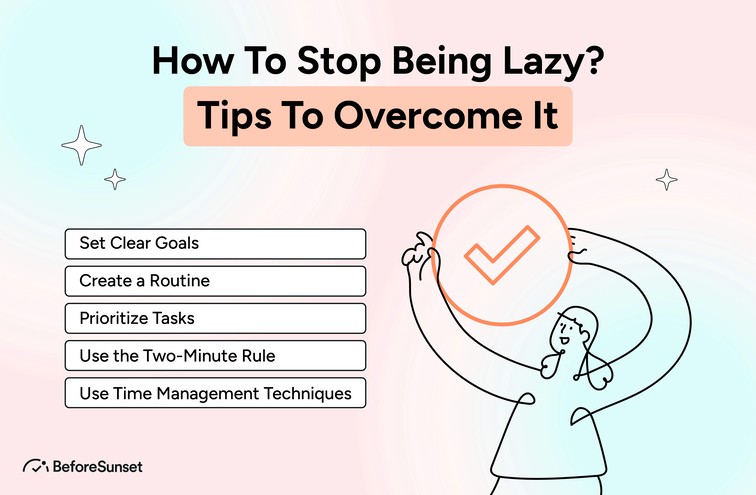Many of us fight against lethargy every day in a world full of options and chances. Self-awareness, successful tactics, and a resolve to escape the shackles of idleness are all necessary to overcome the inertia that prevents us from reaching our goals.
How Can I Stop Being So Lazy? The blog "Tips To Overcome It" sets out on a mission to confront laziness head-on. This investigation digs into concrete ideas intended to help you fight procrastination and spark your inner drive, from comprehending the fundamental reasons for this behavior to developing habits that motivate action.
These suggestions provide a toolbox to help you break free from the bonds of sloth and enter a world of productivity, purpose, and achievement, whether your goals are personal growth, academic success, or professional greatness. Join us as we reveal the techniques for converting inertia into vigor and turning potential into real advancement.

Understanding Your Motivation
Human activities and behaviors are motivated by motivation. It ignites our desire to establish objectives, go for our aspirations, and conquer obstacles. Our motives affect the choices we make and the directions we take in everything from the tiniest daily duties to the most lofty life goals.
However, comprehending the complex mechanisms behind motivation is no easy task. It involves a delicate balancing act of psychological, emotional, and environmental elements that varies widely from person to person.
In this investigation of "Understanding Your Motivation," we dig into the enthralling realm of what drives us to act, accomplish, and produce. We'll analyze the many motivational kinds that lead us, investigate the underlying theories that explain their origins, and reveal the complex interactions between internal and external factors that affect our drive.
This exploration of motivation will offer insightful information and useful tools, whether your goal is to rekindle your enthusiasm for a project, further your personal development path, or learn more about human behavior.
Identifying the Causes of Laziness
Various underlying causes can lead to laziness. It frequently occurs when motivation wanes due to a lack of specific objectives or a feeling of purpose. The fear of failing can also be a major factor, forcing people to put off or completely avoid doing something.
The desire to engage in activities that need effort might be diminished by low self-esteem and a perception of inadequacy. A project's vastness or an excess of duties can cause overwhelm, which can result in inactivity.
The habit of laziness can also be influenced by a lack of interest, energy depletion, reliance on external rewards, adherence to comfort zones, and the existence of mental health problems.
In order to establish solutions to address them and promote a more motivated and successful way of living, it is necessary to first identify the core causes of these problems. This involves reflection and self-awareness.
Overcoming Negative Feelings and Mental Blocks
Productivity, creativity, and general well-being may all be significantly hampered by negative emotions and mental obstacles. It takes a mix of self-awareness, coping mechanisms, and positive mindset adjustments to overcome these obstacles. The following are useful strategies for overcoming unfavorable emotions and mental obstacles:
Self-Reflection: To start, be aware of your feelings and pinpoint the exact unfavorable ideas or beliefs that are preventing you from moving forward. The first step in overcoming these problems is self-awareness.
Practice Mindfulness: Practice awareness to center oneself in the here and now and lessen emotions of tension or worry. Examples of mindfulness practices include meditation and deep breathing.
Challenge Negative Ideas: When negative ideas come to mind, consider if they are true. Do they reflect reality or are they distorted? Replace them with logical and uplifting viewpoints.
Establish Realistic Goals: Divide bigger activities into more digestible chunks. Reaching these milestones can inspire you and raise your confidence, helping you to overcome obstacles.
Alter Your Environment: Occasionally, a change of environment may alter your viewpoint and inspire innovation. To relax, go to a new workstation or take a stroll.
Seek Inspiration: Surround yourself with things that inspire you, whether it be through talks, art, literature, podcasts, or podcasts. Exposure to novel concepts can inspire original thought.
Exercise Self-Compassion: Be kind to yourself as you would be to a friend. Recognize that failures and unhappy emotions are inevitable aspects of life.
Create a Routine: Consistency might help you overcome mental obstacles. Establish a daily schedule with times set aside for work, rest, and enjoyable activities.
Utilize Positive Affirmations: By using affirmations, you may change the way your brain works. Reiterate encouraging words to combat self-doubt and boost confidence.
Exercise and Physical Activity: Regular exercise releases endorphins, which can lift your spirits, lower your stress level, and aid in the removal of mental obstacles.

Establishing an Action Plan for Self-Motivation
A thorough action plan for self-motivation must go through many crucial phases. Set attainable goals that are then broken down into doable actions as your first step. To keep yourself motivated, discover the inner motives underlying these objectives.
Create a well-organized schedule that strikes a balance between work, breaks, and self-care. Put activities in order of importance, and try to keep distractions to a minimum while working. Develop a good outlook through practicing gratitude, affirmations, and visualization.
Utilize tools like notebooks and to-do lists to keep track of your progress, and honor even the tiniest successes. Take lessons from failures, be flexible, and enlist the aid of close friends or groups that promote responsibility. Above all, be persistent and kind with yourself, understanding that self-motivation is a lifelong path of development and success.
Creating a Task List
This is where the skill of task list creation is needed. More than just a list of things to do, a task list is a useful tool that helps us focus, prioritize, and accomplish our objectives. Learning the technique of creating a task list may turn chaos into clarity and open the door to greater productivity and achievement, whether you're balancing business assignments, personal pursuits, or a combination of both.
In this section of "Creating a Task List," we'll examine methods for effectively constructing lists, methods for classifying activities, and perceptions of how to strike a balance between aspiration and practicality. Join us on this organizational and productive trip as we learn how to transform your goals into doable tasks and your to-dos into successes.
Breaking Down Unpleasant Tasks into Single Tasks
A clever strategy for turning intimidating projects into doable stages is to break them down into smaller, more achievable jobs. You can successfully reduce emotions of tension and resistance by breaking a difficult work down into smaller, doable subtasks.
With this approach, you may concentrate on one job at a time, making progress more observable and maintaining motivation simpler. You gain momentum and confidence by starting with the easier subtasks and working your way up to the more difficult ones.
This method equips you to approach each activity with a clear strategy, encouraging productivity and a sense of achievement as you slowly cross off accomplished subtasks, whether it's a business assignment, a domestic duty, or a personal goal.
Making Attainable and Achievable Goals
Setting yourself up for success requires that you create realistic goals that you can actually achieve. You may make sure that your efforts are concentrated and directed with the help of realistic objectives that are in line with your resources and skills.
These objectives need to stretch you without being oppressive, establishing a balance between ambition and viability. You may build a clear route ahead and avoid feeling intimidated by the work at hand by breaking down major objectives into smaller, doable tasks.
You gain confidence and momentum with each accomplishment, which inspires you to keep working toward your goals. Making reasonable and achievable objectives can ultimately increase your chances of growth and contentment by translating your aspirations into real world results.

Avoid Setting Unrealistic Goals
Setting realistic objectives is essential for sustaining motivation and guaranteeing steady advancement. Even though they may be tempting in their ambition, unattainable objectives can cause frustration, exhaustion, and a sense of failure if they are not met. Instead, choose objectives that are grounded in reality and take into consideration your existing skill level, available resources, and time restrictions.
You may make the road to achievement more manageable by setting realistic goals. This strategy generates a positive cycle of success, builds your self-esteem, and sustains your passion over time.
Keep in mind that setting tough but doable objectives will help you maintain your momentum and experience constant improvement, which will ultimately result in more lasting and meaningful accomplishments.
Prioritizing Tasks and Allocating Time Periods for Completion
A smart method to efficiently managing your workload entails prioritizing activities and assigning them deadlines. You may make sure that you're focusing your attention on projects that are in line with your objectives and obligations by classifying tasks according to their urgency, importance, and effect.
You may increase your productivity by creating a regular routine by designating certain time intervals for each work. You reduce the propensity to multitask or get overwhelmed by allocating yourself a certain amount of time to focus on each job.
This technique aids in maintaining attention and keeps work from dwindling endlessly. Prioritizing activities and sticking to deadlines equips you to make steady progress while upholding a good work-life balance, whether you're addressing business assignments, personal objectives, or everyday chores.

Strategies For Staying Focused and Productive
This investigation digs at practical ideas that allow you to do more with less effort, from time management to overcoming procrastination and workplace optimization. These tactics provide you the skills to increase your attention and productivity whether you're a student aiming for academic achievement, a professional seeking top performance, or an individual seeking personal improvement.
Taking Frequent Breaks Throughout the Day
Taking numerous breaks during the day is a smart strategy that may greatly improve well-being and productivity. While taking a break from work may seem paradoxical, studies regularly demonstrate that doing so improves attention, creativity, and performance as a whole.
By giving your brain time to rest, you may avoid mental tiredness and burnout. You may avoid feeling overwhelmed by structuring your work into concentrated intervals, such as the Pomodoro Technique's 25-minute work blocks and 5-minute breaks.
Stretching, deep breathing, or quick walks are all relaxing activities you may do when taking a break. By integrating this technique, you help to create a rhythm that is balanced, encourages maximum productivity, and supports your well-being all day long.
Allowing Yourself Nap Time When You’re Feeling Exhausted
When you're feeling worn out, giving yourself permission to sleep may have a significant positive impact on your general well-being and productivity. It's not lazy to take a nap; rather, it's a smart approach to revitalize your body and mind.
A quick power sleep of 10 to 20 minutes can increase alertness, improve cognitive performance, and elevate mood. A little sleep might help you recover attention and mental clarity when you're feeling depleted or exhausted, making you more productive and effective after you wake up.
A complete sleep cycle can be experienced during longer naps of 60 to 90 minutes, which can improve problem-solving and memory consolidation. A crucial tool for preserving your physical and mental well-being, napping on a regular basis can result in sustained energy levels, enhanced mood, and greater overall performance.
Stop Being Lazy With BeforeSunset AI
BeforeSunset AI can be helpful in preventing laziness and increasing your overall efficiency and effectiveness by providing tools, features, and strategies that encourage better time management, task organization, and focus.


